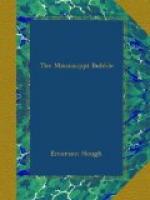Lady Catharine poured for him with a hand none too steady. “Sir Arthur,” said she, “you know why I have this concern over such a quarrel. You know well enough what the duello has cost the house of Knollys. Of my uncles, four were killed upon this so-called field of honor. My grandfather met his death in that same way. Another relative, before my time, is reputed to have slain a friend in this same manner. As you know, but three years ago, my brother, the living representative of our family, had the misfortune to slay his kinsman in a duel which sprang out of some little jest. I say to you, Sir Arthur, that this quarrel must be stopped, and we must do thus much for our friends forthwith. It must not go on.”
“For our friends! Our friends!” cried Sir Arthur. “Ah, ha! so you mean that the old beau hath hit thee, too, with his ardent eye. Or—hang! What—you mean not that this stranger, this Scotchman, is a friend of yours?”
“I speak but confusedly,” said the Lady Catharine. “’Tis my prejudice against such fighting, as you know. Can we not make haste, and so prevent this meeting?”
“Oh, I doubt if there be much need of haste,” said Sir Arthur, balancing his cup in his hand judicially. “This matter will fall through at most for the day. They assuredly can not meet until to-morrow. This will be the talk of London, if it goes on in this pell-mell, hurly-burly fashion. As to the stopping of it—well now, the law under William and Mary saith that one who slays another in a duel of premeditation is nothing but a murderer, and may be hanged like any felon; hanged by the neck, till he be dead. Alas, what a fate for this pretty Scotchman!”
Sir Arthur paused. A look of wonder swept across his face. “Open the window, Annie!” he cried suddenly to the servant. “Your mistress is ill.”
CHAPTER XI
AS CHANCE DECREED
Mischance delayed the carriage of Beau Wilson in its journeying to Bloomsbury Square. It had not appeared at that moment, far toward evening, when John Law, riding a trembling and dripping steed, came upon one side of this little open common and gazed anxiously across the space. He saw standing across from him a carriage, toward which he dashed. He flung open the carriage door, crying out, even before he saw the face within.
“Will! Will Law, I say, come out!” called he. “What mad trick is this? What—”
He saw indeed the face of Will Law inside the carriage, a face pale, melancholy, and yet firm.
“Get you back into the city!” cried Will Law. “This is no place for you, Jack.”
“Boy! Are you mad, entirely mad?” cried Law, pushing his way directly into the carriage and reaching out with an arm of authority for the sword which he saw resting beside his brother against the seat. “No place for me! ’Tis no place for you, for either of us. Turn back. This foolishness must go no further!”




